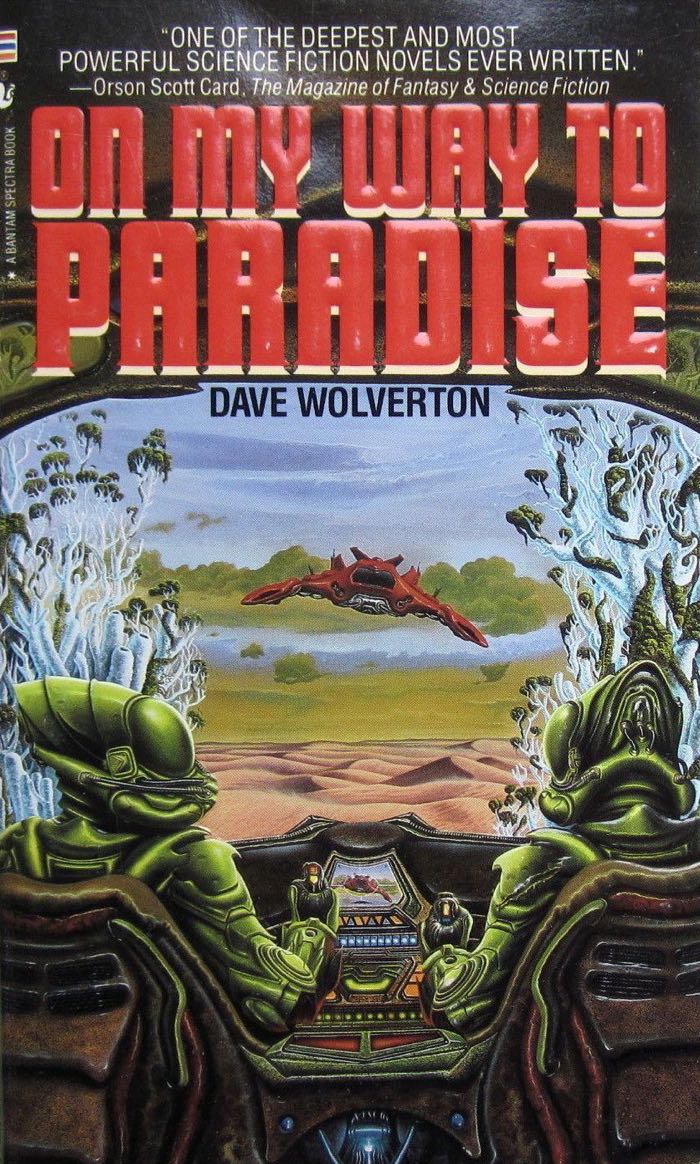On My Way to Paradise
Reviewed date: 2004 Jul 6
Rating: 3
521 pages
Angelo Osic scratches out a living in Panama, a sliver of capitalist freedom sandwiched between Colombia and Costa Rica. After Angelo aids a stranger he finds himself running for his life--for the long arm of the Socialists reaches even into Panama. Running from the Socialists, not knowing quite why or what he has done, Angelo escapes by leaving Earth, by signing up with the Motoki Corporation to be a hired soldier in a war on a frontier planet.
Angelo struggles to learn how to survive in his new world of violence and muddy morality. How does Angelo's Latin concept of honor fit with the societal ideals of his Japanese employers? There is culture clash, certainly. The Motoki Corporation expects its employees to subscribe to the Japanese concept of honor, but Angelo and his fellow Latin American hired mercenaries understand only Latin honor.
The result is a story of culture clash, honorable violence, senseless violence, territoriality, and the quest of one man to make sense of it all. Is it a good story? Yes and no.
On My Way to Paradise is written in three sections. The first shows Angelo on Earth, the second in space en route to the planet Baker, and the third on Baker. The space section is intriguing, as Wolverton clearly shows the Japanese and Latin cultures clash. This is also where Angelo and his compadres train in the battle simulators: virtual reality worlds where one can be killed over and over until one learns to fight. The battle simulations remind one of the Battle Room in Ender's Game, but with full virtual reality and with adults, not children. This is crucial, as adults react differently to the stress of the battle simulations than the children of Ender's Game react to the Battle Room.
The third section of the book shows what happens to Angelo and his friends on Baker, where they are to fight alongside the samurai of Motoki Corporation to rid Baker of the Yabajin barbarians. The culture clash that started in space grows to greater importance on Baker. But this section drags--Wolverton spends too much time debating philosophy and not enough time storytelling.
The worst part of the book is the first section. It sets the stage for the story, but it is not the story--the story does not start until section two, in space. Yet Wolverton spends 90 pages prodding Angelo into action to get him off Earth. Not good enough. I don't have the patience to wait 90 pages for the real story to begin.
The second section of the book is good enough for me to rate the whole book a 3, but I do not recommend On My Way to Paradise. I leave you with a quote from another review:
Andrew R. Hall
The opening is strong, but by half way through the story feels like it is getting longer than the material warrants. Three quarters through I am begging him to end the thing. A good chunk of the last quarter involves a long voyage over an alien planet, with lots of descriptions of the exotic creatures they encounter. The creatures are interesting, but it feels like an exercise from a "creating alien creatures" unit in a science fiction writing class. It doesn't move the story ahead at all. As I say, there are good parts, and Wolverton's favorite theme -- the struggle to act morally in a violent, immoral world -- is clearly presented. But all the parts don't add up to a satisfying whole.
